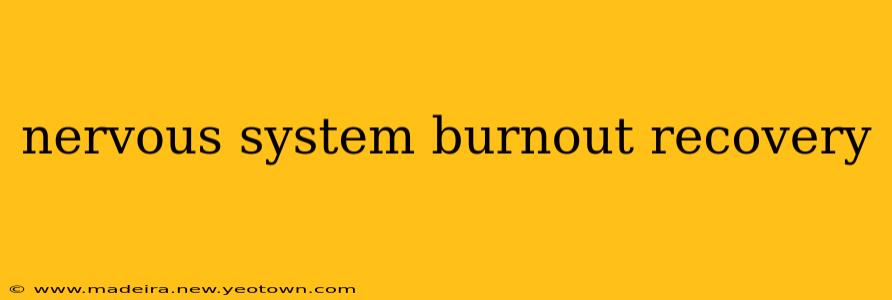The modern world is relentless. The constant barrage of demands – work deadlines, family obligations, social media notifications – can leave even the most resilient individuals feeling depleted, frayed, and utterly overwhelmed. This isn't just stress; it's often a full-blown nervous system burnout. This isn't something to be brushed aside; it's a serious condition demanding careful attention and a holistic approach to recovery. My journey back from the brink of nervous system burnout taught me the importance of patience, self-compassion, and a deep understanding of my body's needs. Let me share what I learned, hoping it can guide you on your own path to healing.
What is Nervous System Burnout?
Nervous system burnout isn't a clinically recognized diagnosis in the same way as, say, depression or anxiety. However, it accurately describes a state where your nervous system is chronically overstimulated and unable to regulate itself effectively. Imagine your nervous system as a finely tuned instrument; constant pounding and jarring eventually lead to a breakdown. Symptoms can vary greatly but often include:
- Persistent fatigue: This goes beyond simple tiredness; it's a deep, bone-aching exhaustion that doesn't improve with sleep.
- Irritability and emotional instability: You might find yourself snapping at loved ones, experiencing sudden bursts of anger or sadness, or feeling overwhelmed by seemingly minor events.
- Difficulty concentrating and focusing: Brain fog, memory problems, and an inability to stay on task become common experiences.
- Physical symptoms: Headaches, digestive issues, muscle tension, insomnia, and heart palpitations are frequent companions.
- Emotional numbness or detachment: A feeling of disconnection from yourself and the world around you can set in.
How Long Does it Take to Recover from Nervous System Burnout?
This is a question without a simple answer. Recovery timelines are highly individual and depend on several factors, including the severity of the burnout, the individual's resilience, and the effectiveness of their recovery strategies. It's a marathon, not a sprint. Some people see significant improvement within a few months, while others may require a year or longer to regain a sense of balance. Patience and self-compassion are crucial throughout this process.
What are the Stages of Nervous System Burnout Recovery?
Recovery is rarely linear. It's more like a winding path with ups and downs. However, generally, you'll move through phases:
- Acknowledgement and Acceptance: The first step is recognizing that you're experiencing burnout and accepting that recovery will take time and effort.
- Rest and Restoration: Prioritizing rest, both physical and mental, is crucial. This involves getting enough sleep, practicing relaxation techniques, and creating a supportive environment.
- Rebuilding Resources: This phase focuses on replenishing your energy stores through healthy eating, regular exercise, and engaging in activities that bring you joy and a sense of purpose.
- Re-integration and Prevention: Gradually re-introducing yourself to daily life while maintaining healthy boundaries and implementing strategies to prevent future burnout is vital.
How to Recover from Nervous System Burnout: Practical Strategies
My recovery involved a multi-pronged approach, focusing on the following key areas:
- Prioritizing Sleep: Aim for 7-9 hours of quality sleep each night. Establish a regular sleep schedule, create a relaxing bedtime routine, and optimize your sleep environment.
- Mindfulness and Meditation: Daily mindfulness practices can help calm the nervous system and improve stress regulation. Even a few minutes a day can make a difference.
- Gentle Movement: Avoid intense exercise initially. Instead, focus on gentle activities like yoga, tai chi, or walks in nature. These can help reduce stress and promote relaxation.
- Nutrition: Nourish your body with whole, unprocessed foods. Limit caffeine and alcohol, and ensure you're getting enough vitamins and minerals.
- Setting Boundaries: Learn to say no to commitments that drain your energy. Prioritize your well-being and protect your time.
- Connecting with Nature: Spending time outdoors has been shown to have significant stress-reducing benefits.
- Seeking Professional Support: If you're struggling to manage your symptoms, don't hesitate to seek help from a therapist or healthcare provider.
Can You Recover Completely from Nervous System Burnout?
Yes, absolutely! While complete recovery takes time and dedication, it is entirely possible to regain your energy, resilience, and sense of well-being. The key is to commit to a holistic approach that addresses the physical, emotional, and mental aspects of your burnout. Remember that recovery is a journey, not a destination. Celebrate your progress along the way, and be kind to yourself throughout the process. You deserve to feel healthy and vibrant again.

